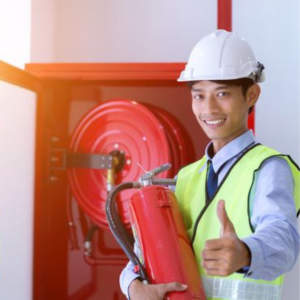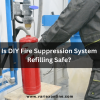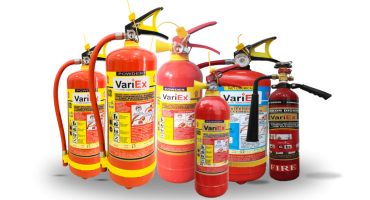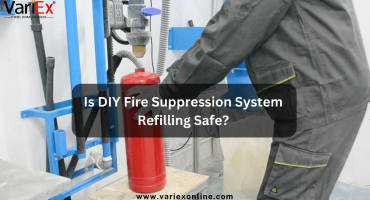![]()
Fire Immuniser
+91-7829629111
Email: info@variex.in
Varistor Technologies Pvt. Ltd.
Block-1, First Floor, Ardente Office One, Hoodi Circle, ITPL Main Road, Bengaluru, Karnataka 560048, IN
Do I Need To Refill Fire Extinguisher Every Year
Introduction
Every year, thousands of fires occur worldwide, causing significant damage to property and sometimes even claiming lives. To mitigate the devastating effects of fires, having a fire extinguisher readily available is essential. But once you have a fire extinguisher, you may wonder if it needs to be refilled every year. In this article, we will explore the importance of regular fire extinguisher maintenance and answer the question, "Do I need to refill a fire extinguisher every year?"
The Purpose of Fire Extinguishers
Fire extinguishers are designed to suppress and extinguish fires in their early stages, preventing them from spreading and causing further destruction. They come in different types, each specifically formulated to tackle different classes of fires. The most common types of fire extinguishers include dry chemical, foam, water, and carbon dioxide (CO2).
The Shelf Life of Fire Extinguishers
Fire extinguishers, like any other manufactured item, have a limited shelf life. The lifespan of a fire extinguisher can vary depending on the manufacturer and type, but the average shelf life ranges from 5 to 15 years. It is crucial to check the manufacturing date indicated on the extinguisher to determine its age. Remember, an expired fire extinguisher may not function correctly when needed the most.
The Importance of Annual Inspections
While fire extinguishers have a shelf life, they still require regular maintenance to ensure they are fully functional. Annual inspections are vital to guarantee that your fire extinguisher will operate correctly in an emergency. These inspections should be carried out by a professional fire safety technician who can check the pressure, condition, and integrity of the extinguisher.
Refilling vs. Recharging
When discussing fire extinguisher maintenance, it is essential to understand the difference between refilling and recharging. Refilling involves replacing the extinguishing agent in the extinguisher, whereas recharging refers to adding or replacing the propellant gas. It is recommended to consult the manufacturer's guidelines or a fire safety professional to determine whether your fire extinguisher needs refilling or recharging.
Fire Extinguisher Inspection Procedure
During an annual inspection, a fire safety technician will perform a series of tests to assess the condition and functionality of your fire extinguisher. These tests typically include:
1. Checking the pressure gauge: The technician will ensure that the pressure gauge on the extinguisher shows the recommended level.
2. Inspecting for damages: The fire extinguisher's body will be inspected for any signs of corrosion, leakage, or physical damage that may affect its performance.
3. Examining the hose and nozzle: The technician will check for cracks or other damages in the hose and ensure that the nozzle is clean and unobstructed.
4. Weighing the extinguisher: The technician will weigh the extinguisher to verify that it has not lost any extinguishing agent. If it has lost weight, refilling may be necessary.
When to Refill a Fire Extinguisher
Refilling a fire extinguisher should be done when any of the following conditions exist:
1. Loss of extinguishing agent: If the extinguisher has been discharged partially or fully, it will need to be refilled to restore its capacity.
2. Expiration date reached: If the fire extinguisher has surpassed its manufacturer-stated expiry date, it should be refilled or replaced.
3. Failed inspection: If the annual inspection reveals any faults or damages that cannot be repaired, refilling or replacing the extinguisher may be necessary.
The Dangers of Neglecting Fire Extinguisher Maintenance
Neglecting fire extinguisher maintenance can have detrimental consequences. A poorly maintained or expired fire extinguisher may fail to function when needed, putting lives and property at risk. Moreover, in commercial settings, neglected extinguishers can lead to violations of fire safety regulations, resulting in fines or other legal consequences. By ensuring regular maintenance and refilling when necessary, you can greatly enhance the effectiveness of your fire extinguishers.
Conclusion
Fire extinguishers are essential tools that can save lives and prevent extensive property damage during a fire. Regular maintenance, including annual inspections and refilling when required, ensures that your fire extinguisher remains in optimal condition. By adhering to these guidelines, you will have peace of mind, knowing that your fire extinguisher is prepared to combat a fire effectively when the need arises. Remember, fire safety is of utmost importance, and timely maintenance of fire extinguishers is a crucial part of a comprehensive fire safety plan.
Final Say
We at VariEx.in or Variexonline.com have mastered the art of designing, installing, inspecting, and fixing automatic sprinkler systems with the help of our in-house team, which is capable of delivering the fire sprinkler services you need, whether large or small and at affordable cost.
To schedule a fire sprinkler installation, or you think our services could benefit your commercial property, contact us online or give us a call at, 7829629111










